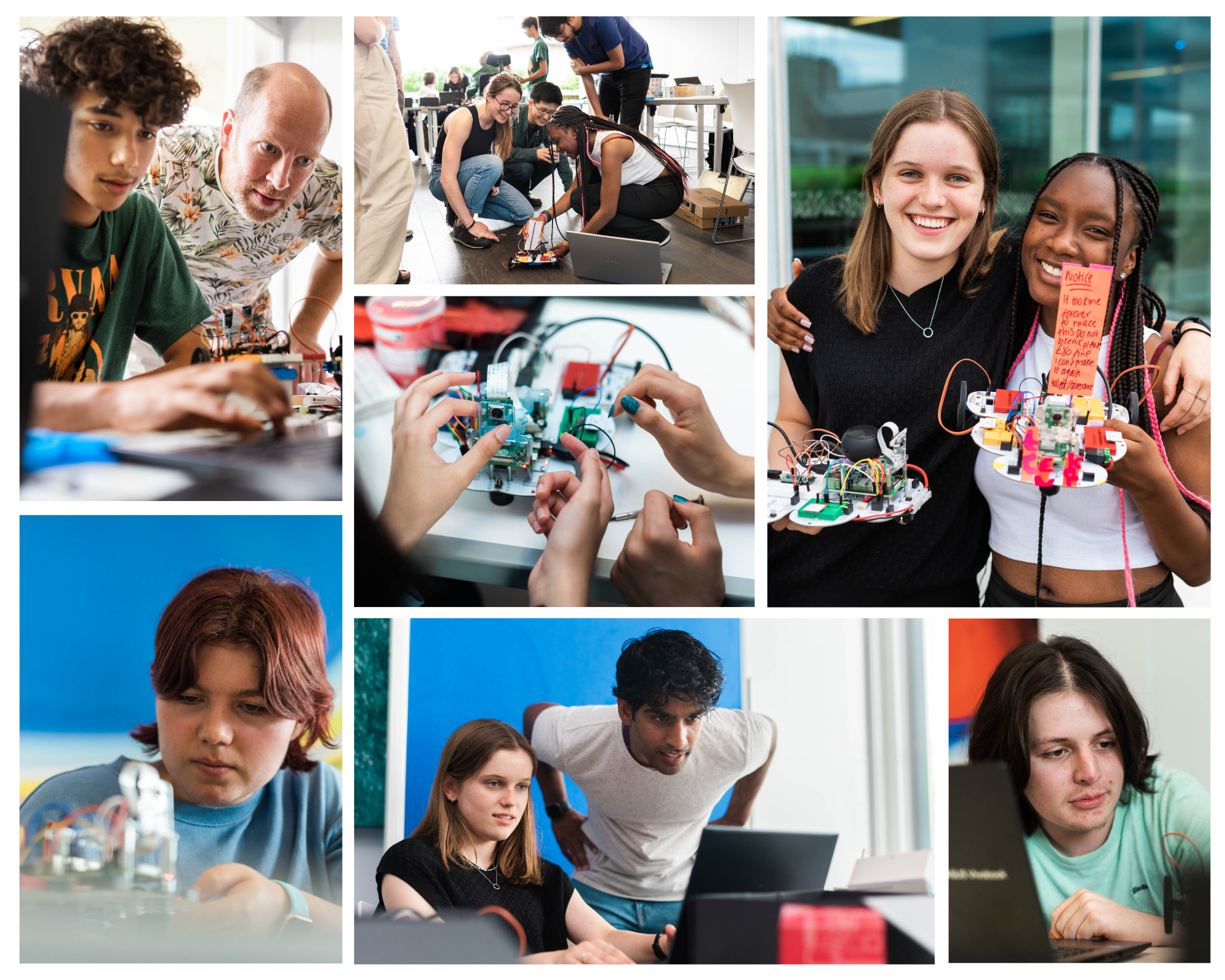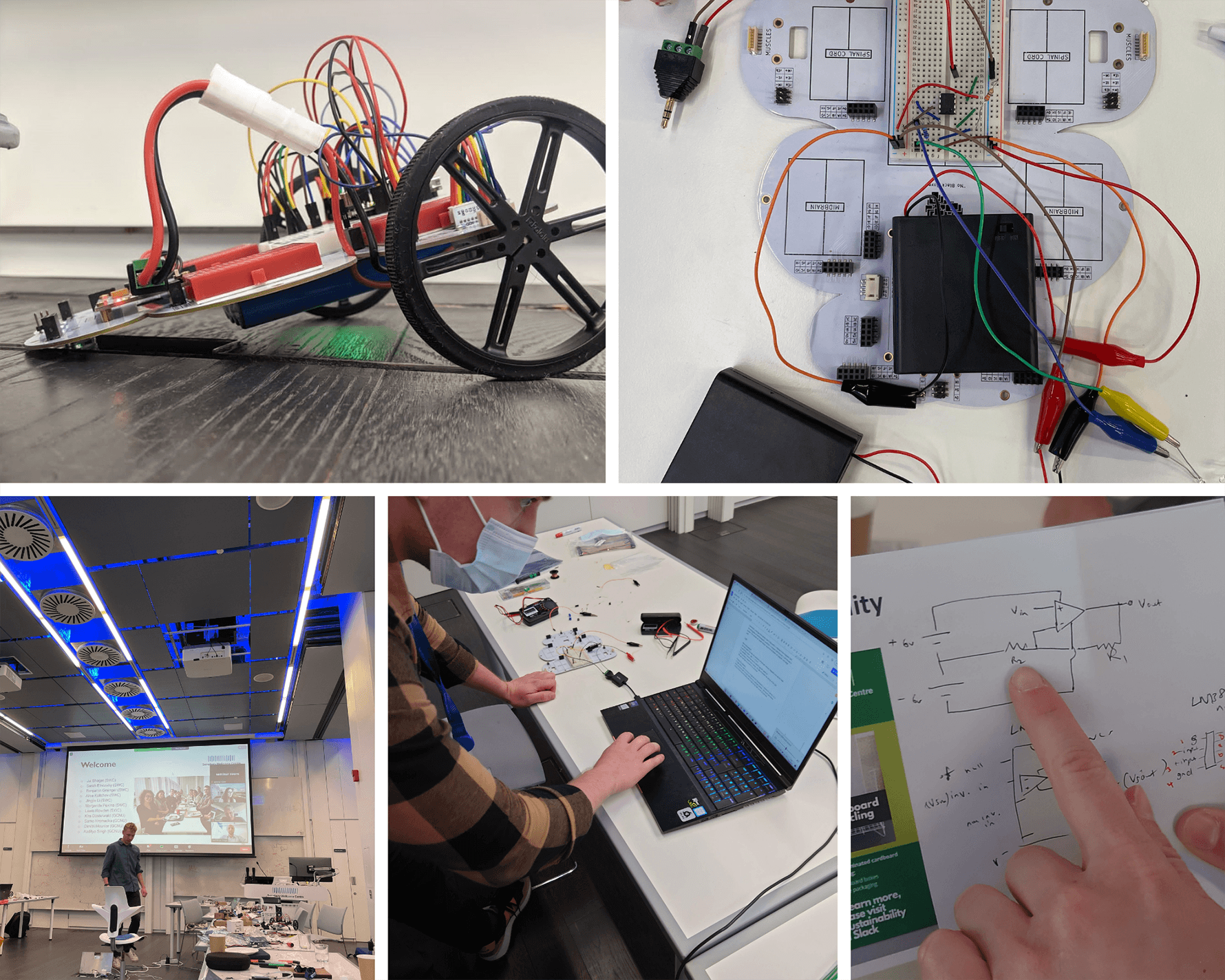
Neuronauts
Neuronauts is an educational outreach programme for London secondary school students entering years 9-12 that teaches students fundamentals in engineering, computer science, neuroscience, and artificial intelligence, while allowing them to pursue creative projects in these spaces. Neuronauts has two annual iterations a year:
- a fully-funded annual two week summer camp, and
- a fully-funded school club that meets every 2 weeks over 20 weeks during the academic school year.
Applications for this year's summer camp have now closed. For similarly themed sessions that may take place later in 2025 and 2026, please sign-up to receive Neuronauts notifications or email Pip Coen p.coen@ucl.ac.uk.
The course is hosted by the Sainsbury Wellcome Centre (SWC) and organised by a team of PhD students and external collaborators including the Voight-Kampff Project.
What does Neuronauts involve?
Students are invited to SWC to build systems and run their own behavioural neuroscience experiments. The neurokit, which in past years has consisted of a Raspberry Pi 4 microcomputer, Arduino microcontroller, EMG sensor, robot rover chassis, Electronics and Breadboard starter kit, and more, allows students to apply in practice the physics and computer science theory they are taught.
While designing their own experiments, students use the Bonsai and Python programming languages to analyse acquired data.
Neuronauts iterations and courses
The summer camp is held at the Sainsbury Wellcome Centre, UCL, 25 Howland Street, London, W1T 4JG.
- Neuronauts 2022 was held from July 25 – August 5 2022, Mondays – Friday from 9.30 – 17.30
- Neuronauts 2023 was held from July 10 – July 14 2023, Monday – Friday from 10.00 – 17.00
- Neuronauts 2024 was held from July 29 – August 9 2024, Monday – Friday from 9.30 – 17.30
- Neuronauts 2025 was held from July 28 – August 8 2025, Monday – Friday from 9.30 – 17.00

The camp is fully funded including: lunch, snacks, transportation costs (within London Zones 1-6), and all required equipment is provided.
In 2024 the camp expanded to 20 students, with the support of the EDI Contribution and engagement fund, and students worked with live animals for the first time—genetically engineered fruit flies supplied by James Jepson.
The school club is also held at at the Sainsbury Wellcome Centre, UCL, 25 Howland Street, London, W1T 4JG.
- Neuronauts School Club 2023 took place from 12 - 4.30pm every other Saturday from 14 January to 25 March 2023
- Neuronauts School Club 2024 took place from 12 - 4pm every other Saturday from 13 January to 23 March 2024
- Neuronauts School Club 2024/2025 took place from 12 - 4pm every other Saturday from 26 October 2024 to 22 March 2025
History of Neuronauts
Neuronauts was inspired by SWC’s PhD Boot Camp and is a sister programme of Neuronautas. Below are pictures and videos taken from projects of earlier students.
Elena Dreosti and Adam Kampff describe The Last Black Box course for PhD students at the Sainsbury Wellcome Centre. To find out more about the Cajal Programme visit: www.cajal-training.org

Frequently Asked Questions from Applicants
What is neuroscience?
Neuroscience is the study of the nervous system (brain, spinal cord, nerves) and how this system lets us interact with our environment (e.g., seeing or smelling), move our bodies, and imagine both the past and the future (e.g., remember nice holidays we took or predict our crush’s reaction when we ask them out). At Neuronauts we will study neuroscience with a mix of classroom lectures, in-person experiments, and hands-on data collection.
What is computer science?
Computer science is the study of the structure and interpretation of computer programs and how they can do mathematics (e.g., a calculator), automate processes (e.g., an assembly-line robot), or store information (e.g., a digital photo album). At Neuronauts we will study computer science with a mix of classroom lectures and hands-on time to build simple robots and other computing systems.
Am I eligible to apply for Neuronauts?
Students aged between 13-17 years attending a state school (or home-schooled) in the Greater London area are eligible to apply. Preference will be given to applicants who meet our Equality, Diversity and Inclusion (EDI) criteria:
Meet at least ONE of the following:
- You are eligible for Free School Meals
- You have been in care
OR meet at least TWO of the following:
- Your parents/guardians did not go to university
- Your household income is less than £45,000 per year
- The occupation of your main household earner is in one of the Social Mobility Commission categories below:
- Technical and craft occupations such as: motor mechanic, plumber, printer, electrician, gardener, train driver
- Routine, semi-routine manual and service occupations such as: postal worker, machine operative, security guard, caretaker, farm worker, catering assistant, sales assistant, HGV driver, cleaner, porter, packer, labourer, waiter/waitress, bar staff
- Long-term unemployed (claimed Jobseeker's Allowance or earlier unemployment benefit for more than a year)
We want to help as many people as possible who are underrepresented in science. If you are in doubt whether you would be considered, we recommend applying.
My school grades aren’t very good. Can I still apply?
Yes! Scientists come in all shapes and sizes, including those who didn’t like school or struggled with grades. (Not to mention, most of the things that scientists work on don’t have much to do with school or grades.) Are you curious about how the world works? Do you like getting creative, or solving puzzles or problems? Do you like working with your hands, to build or draw? If you said yes to any of these questions, and you are interested in neuroscience and computer science, we absolutely want you to apply.
I’m not sure I have any experience doing science. Is this okay?
Yes! Good news—every scientist who ever was started with no experience! If you have ever built something, taken a photo, written down your thoughts, figured out maths on a scrap of paper, solved a puzzle, or done any activity where you had to be creative and observant, you already have experience as a scientist. As a Neuronaut, you will grow your experience specifically within neuroscience and computer science, so if you like these topics, you will have a great time.
Someone told me once that I “don’t look like a scientist.” Will I fit in?
Would you believe it if we told you that many of the scientists leading Neuronauts have at some point been told the very same thing? And yet here we are! There is no single way to look or act like a scientist. A scientist is anyone who is creative, curious, and observant about the world around them—that’s it! If you want to learn and play with other creative and curious people, you will absolutely fit in with the Neuronauts team.
I might need accommodations (like rest/prayer breaks, allergy-safe food, or ramp access) to keep up with the course. Can this be arranged?
Yes! Accommodations can absolutely be arranged to make sure you can get the most out of Neuronauts. When you fill out your application form, please tell us a bit about your needs at the end, so we have ample time to do a good job with this.
Can you explain a bit more what you mean by “fully funded”?
We don’t want anyone to feel like they can’t attend Neuronauts because they can’t afford it. Over the two-week course, we will cover the costs of:
-
Your travel to and from Neuronauts via public transportation, from within any London postcode.
-
Your course materials, like notebooks, pencils, and equipment.
-
Your snacks and lunch for each day of the course.
Travel will be paid for via reimbursement, but if that’s an issue for you (or if you’re slightly farther afield than London), be in touch and we will sort something out.
I don’t want to go to school in the summer, I want to play! How is Neuronauts structured?
Fair point! We don’t want to go to school either, so we designed Neuronauts to be all about play. (Did you know that one of our organisers is a puppeteer?) About 25% of the time will be spent in lectures, to cover some fundamentals (but these are designed to be fun, with no homework!). The rest of the time will be spent doing hands-on work in teams, writing code, and running experiments. The full course schedule will be available on this webpage in June.
Can I attend only some parts of Neuronauts?
To make it the best possible experience, you should be able to attend the full course of Neuronauts. You will learn new things across the days, build on that knowledge, and then use it in your own projects. Therefore, it’s important that you’ll be able to attend from the starting day until the last day, for most of the scheduled hours.